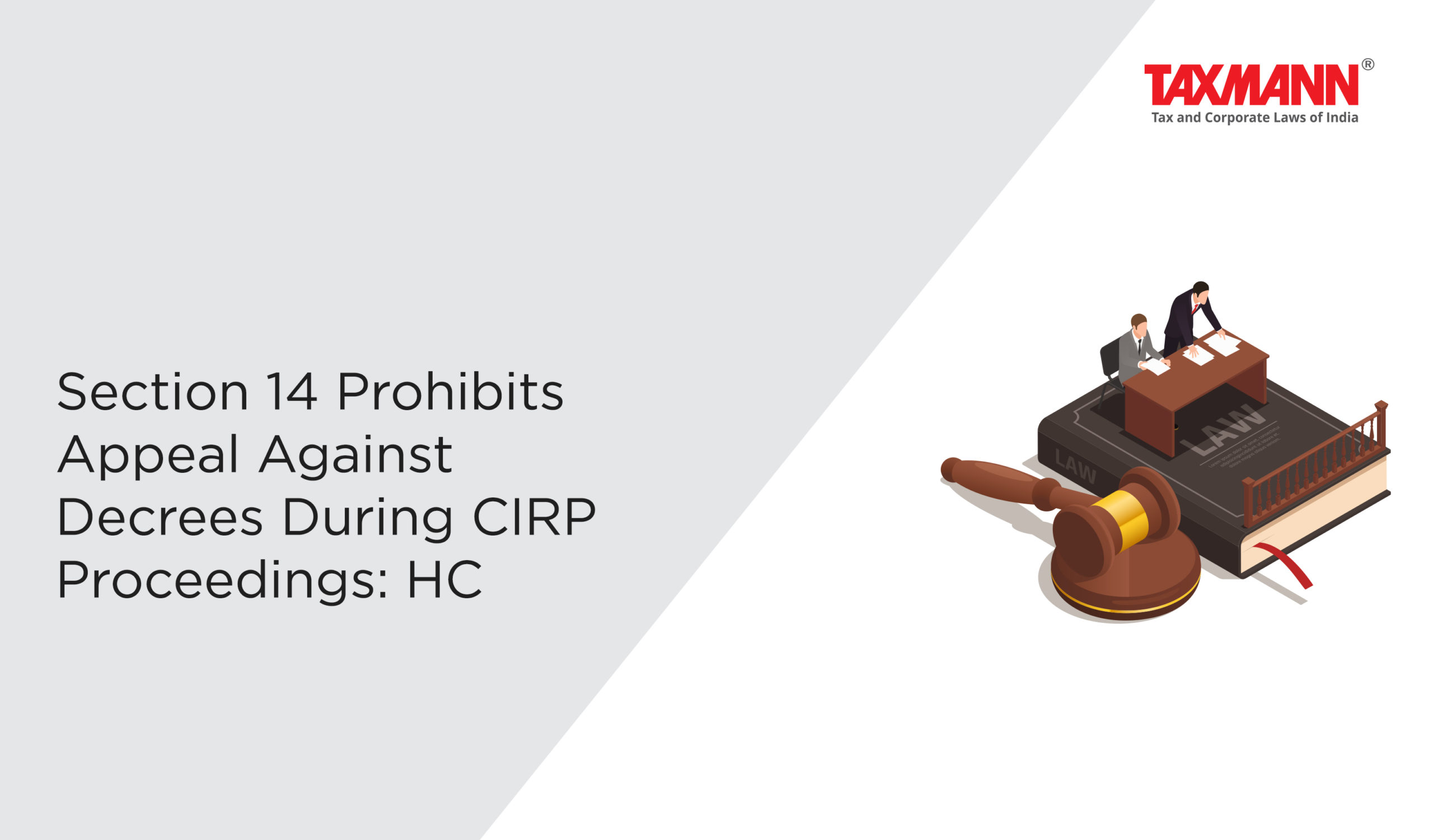Section 14 Prohibits Appeal Against Decrees During CIRP Proceedings: HC
- Blog|News|Insolvency and Bankruptcy Code|
- 2 Min Read
- By Taxmann
- |
- Last Updated on 20 June, 2023

Case Details: G.K. Ispat (P.) Ltd. v. Consolidated Construction Consortium Ltd. - [2023] 150 taxmann.com 319 (HC-Karnataka)
Judiciary and Counsel Details
-
- G. Narendar & S. Rachaiah, JJ.
- P.S. Rajagopal for the Appellant.
- Ajesh Kumar S., Advocate for the Appellant.
- P.S. Rajagopal, Sr. Counsel & H. Mujtaba, Advocate for the Respondent.
Facts of the Case
In the instant case, the corporate debtor filed a suit in which the appellant was held liable to pay certain sums along with the interest. The appellant, on the other hand, filed another suit seeking the recovery of certain sums from the corporate debtor. However, the suit was rejected by a decree.
Meanwhile, another financial creditor, who had extended assistance to the corporate debtor filed an application u/s 9 of the IBC against the corporate debtor before the Adjudicating Authority (NCLT). The same was admitted declaring a moratorium and an IRP was appointed.
The appellant challenged both decrees passed in the suits vide an instant appeal. The High Court observed that Section 13 declares a moratorium after the admission of the application under sections 7, 9 or 10. Further, Section 14 provides for the consequences of such a declaration of the moratorium and section 14(1)(a) prohibits the institution of suits and continuation of pending suits or proceedings against the corporate debtor.
High Court Held
The High Court, further observed that it was apparent that the prohibition under section 14 prohibiting the initiation of proceedings or continuation of proceedings was in place as on the date of filing of the appeal.
The High Court also noted that the IRP was unable to obtain a resolution plan within the specified time and the resolution plan not having manifested and the request for an extension of time had been rejected by the Tribunal, the consequences as provided by the proviso to section 14 were deemed to have taken effect.
The High Court held that since the moratorium u/s 14 of the IBC which prohibits the initiation or continuation of proceedings was in place as on the date of filing of the instant appeal, the same could not be registered and the parties ought to have waited for the result of proceedings pending before the NCLT u/s 9 of the IBC. Accordingly, the appeal stands disposed of.
List of Cases Referred to
-
- State Bank of India v. Consolidated Construction Consortium Ltd. [2021] 127 taxmann.com 47 (NCLT – Chennai) (para 9).
Disclaimer: The content/information published on the website is only for general information of the user and shall not be construed as legal advice. While the Taxmann has exercised reasonable efforts to ensure the veracity of information/content published, Taxmann shall be under no liability in any manner whatsoever for incorrect information, if any.

Taxmann Publications has a dedicated in-house Research & Editorial Team. This team consists of a team of Chartered Accountants, Company Secretaries, and Lawyers. This team works under the guidance and supervision of editor-in-chief Mr Rakesh Bhargava.
The Research and Editorial Team is responsible for developing reliable and accurate content for the readers. The team follows the six-sigma approach to achieve the benchmark of zero error in its publications and research platforms. The team ensures that the following publication guidelines are thoroughly followed while developing the content:
- The statutory material is obtained only from the authorized and reliable sources
- All the latest developments in the judicial and legislative fields are covered
- Prepare the analytical write-ups on current, controversial, and important issues to help the readers to understand the concept and its implications
- Every content published by Taxmann is complete, accurate and lucid
- All evidence-based statements are supported with proper reference to Section, Circular No., Notification No. or citations
- The golden rules of grammar, style and consistency are thoroughly followed
- Font and size that’s easy to read and remain consistent across all imprint and digital publications are applied



 CA | CS | CMA
CA | CS | CMA
